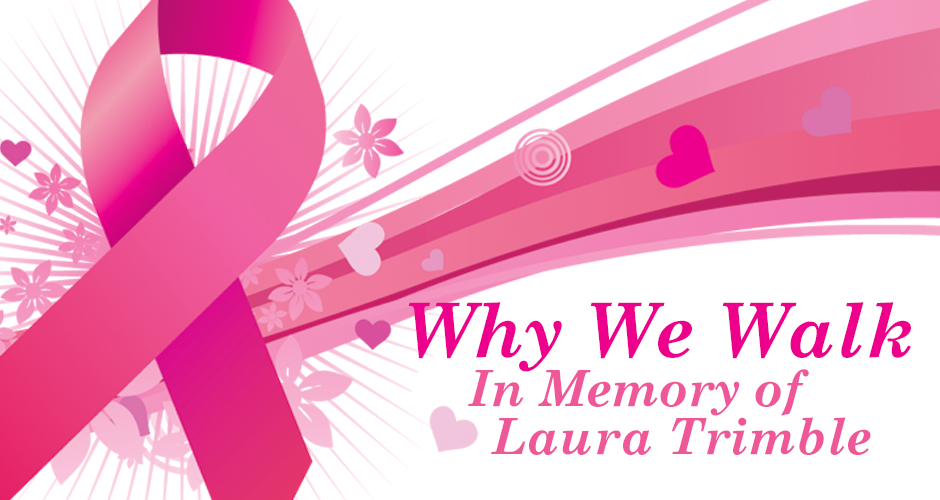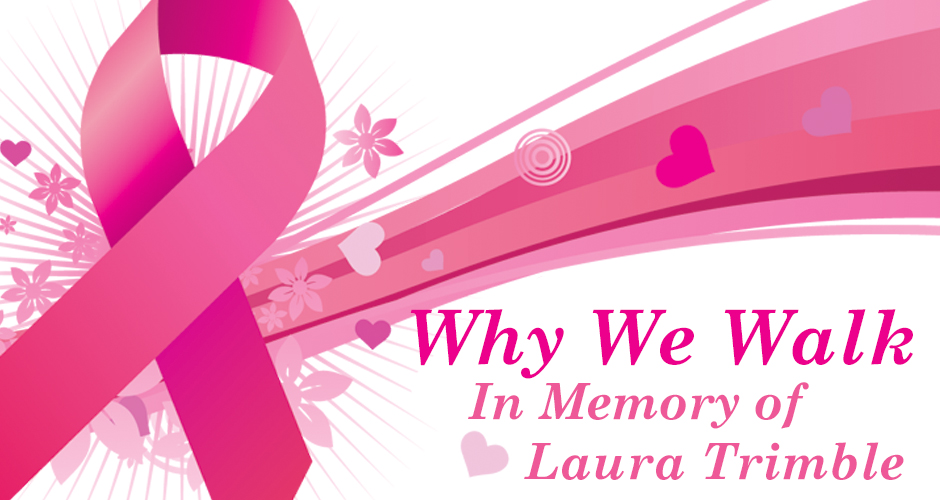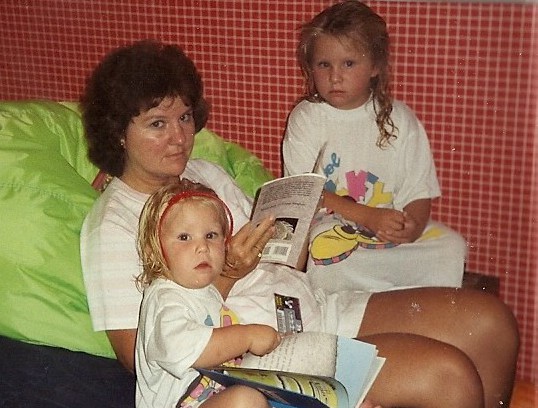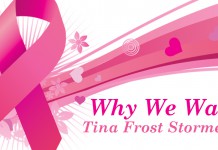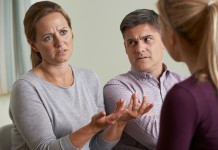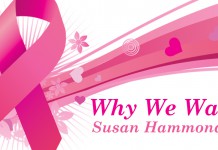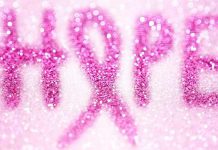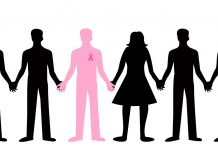In the third installment of our ‘Why We Walk’ series, we introduce Kent Trimble and his daughter, Cortney Murphy. After Laura Trimble passed away from breast cancer 19 years ago, the family has made it their mission to walk in memory of her and build awareness about breast cancer prevention.
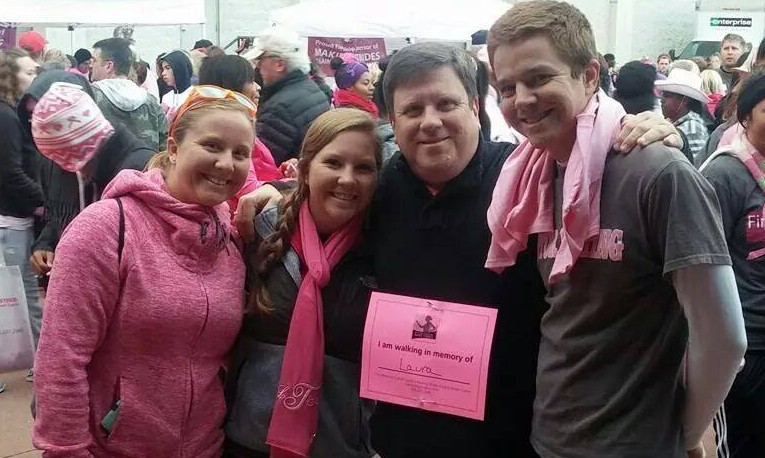
Their message: Cherish every moment you have with your family and friends. Don’t take anything for granted.
Can you briefly tell us a little about yourself?
Kent: My name is Kent Trimble. I am 54, a father of three and grandfather of one. I have lived in the Dayton, Ohio area my entire life.
Cortney: My name is Cortney Murphy and I am 25 years old. I graduated from Wright State University in 2013 with a degree in Rehabilitation Services and am now employed by the Greene County Board of Developmental Disabilities. I love spending time with my family, playing softball and volleyball, and I am a huge Cincinnati Bengals and Florida Gators fan.
How old was your wife/mom when she was diagnosed with breast cancer?
Kent: Laura was diagnosed at the age of 30 and passed away at 35.
Cortney: I was only six when my mom passed away, so I don’t remember much.
How was the cancer detected?
Kent: Laura went to the gynecologist after our last child was born. She had waited to go to the doctor for almost two years. A lump was detected under her arm. It was pretty deep and hard to detect, especially for a person without knowledge in the medical field. She was scheduled for a scan and then a biopsy. The tests came back as cancerous.
How did you, your wife and your family react to this news?
Kent: When the lump was first detected, we remained upbeat and positive since other women in her family – her mother and grandmother – had lumps found in the past, but they were always benign or fibroid cysts. Once we got the results from the biopsy that it was cancer, we didn’t talk about it much at first – we were still in shock. Eventually, we started talking about it and again tried to stay upbeat and positive.
[pullquote align=”left” cite=”” link=”” color=”” class=”” size=””] “Don’t be afraid to talk about breast cancer just because it’s a scary subject. It’s important to be aware and prepared for everything.”
– Cortney Murphy [/pullquote]
What was the treatment process? How did this affect your family?
Kent: Laura had a mastectomy and then underwent six months of chemotherapy. About six months after the chemo, she had reconstructive surgery to help rebuild her confidence. Things went well for another two years and her counts were normal, so our thought was that she was cancer free.
Then one day she hurt her shoulder and when we took her to the emergency room and tests were run, we found out that the cancer had returned. After that, she went through a bone marrow transplant, and when that didn’t work, she did another round of chemo and radiation. Then we found out it had spread to her brain.
Although we handled it pretty well because Laura was a very strong lady, it was stressful with three active kids ranging from six to 15. We didn’t go into specifics with the kids though, just that mom was sick and she was trying to get better.
How has breast cancer affected your outlook on life?
Kent: Cherish every moment you have with your family and friends. Don’t take anything for granted.
Cortney: Losing my mom to breast cancer at such a young age taught me the true value of family. My dad did extremely well raising me and my brother and sister after my mom passed away, and I’m sure it was very difficult having to play both roles. Although it was devastating, it made our family closer.
It also made me realize that people should never take anyone or anything for granted.
What advice would you like to give people about breast cancer?
Kent: Be vigilant about mammograms, self-exams, doctor visits, etc. I don’t know if anything would have helped Laura, but because she waited to go back to the doctor for almost two years, I want to think it would have.
Cortney: Get your routine mammograms and go to your doctors regularly. Don’t assume, ‘Oh, it won’t happen to me,’ because it can. Early detection is key and it can save your life.
How can we raise more awareness about breast cancer prevention?
Cortney: I think the breast cancer walks are a great way to raise awareness, but I also think parents should teach their children how important it is to stay alert, educated and up-to-date on doctor visits, even if breast cancer isn’t in your family history. Also, don’t be afraid to talk about breast cancer just because it’s a scary subject. It’s important to be aware and prepared for everything.
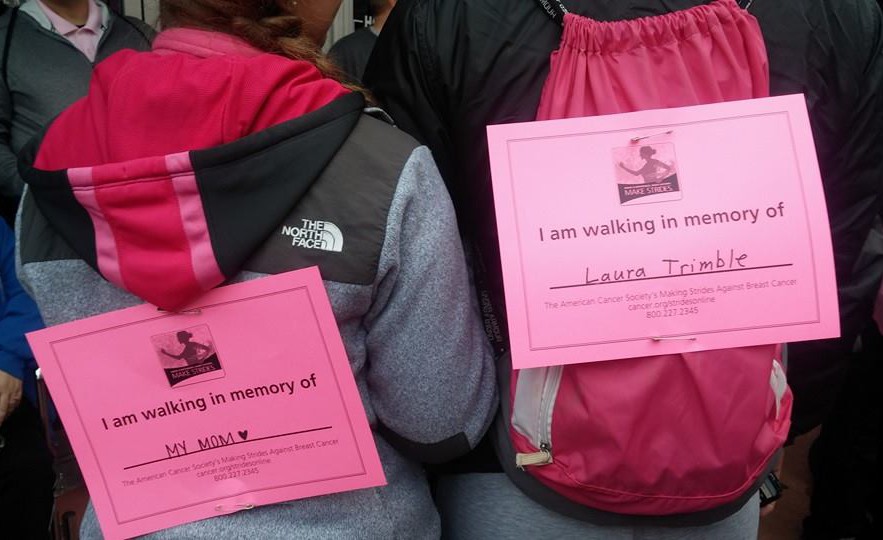
Why do you walk?
Kent: To feel like I am doing my part in bringing awareness to the cause. It’s also a day that my family can get together and remember Laura.
Cortney: I walk in memory of my mom and to support other survivors, as well as victims of the disease. It’s a great way to raise awareness.
Tell us about your team, who participates and why it started. What is your team name?
Kent: Basically it consists of me and the kids. We have others join sometimes or we get together with other groups and walk with them. Actually, my girls got it started. They began walking in a couple of breast cancer walks in Cincinnati and Columbus and then they wanted to walk in Dayton’s and asked if I would want to join.
Cortney: Our team consists of my dad, sister, brother, husband and myself. We typically meet up and walk with another team called Team Shannon. Shannon is a friend of ours who is a survivor of breast cancer. When I got into high school, I started hearing about these walks and that’s when I decided it would be awesome for my family to walk in memory of my mom. So every year after that, we have walked for her.
What is your message to people who may think they are too young to be diagnosed with breast cancer?
Cortney: There is no criteria for someone who can be diagnosed with breast cancer. It can happen to anyone at any time. It is so important to be aware of your family history, make routine mammogram and doctor’s visits and just be aware of your health. Early detection saves lives and can help give you a better chance of winning the fight.
*In loving memory of Laura Trimble*
*If you would like to share your story or know someone who may be interested, please contact us at social@www.bisk.com.


